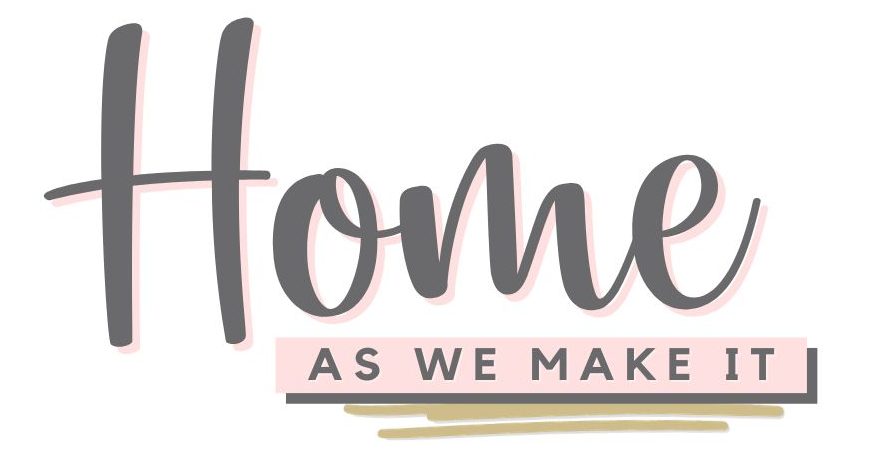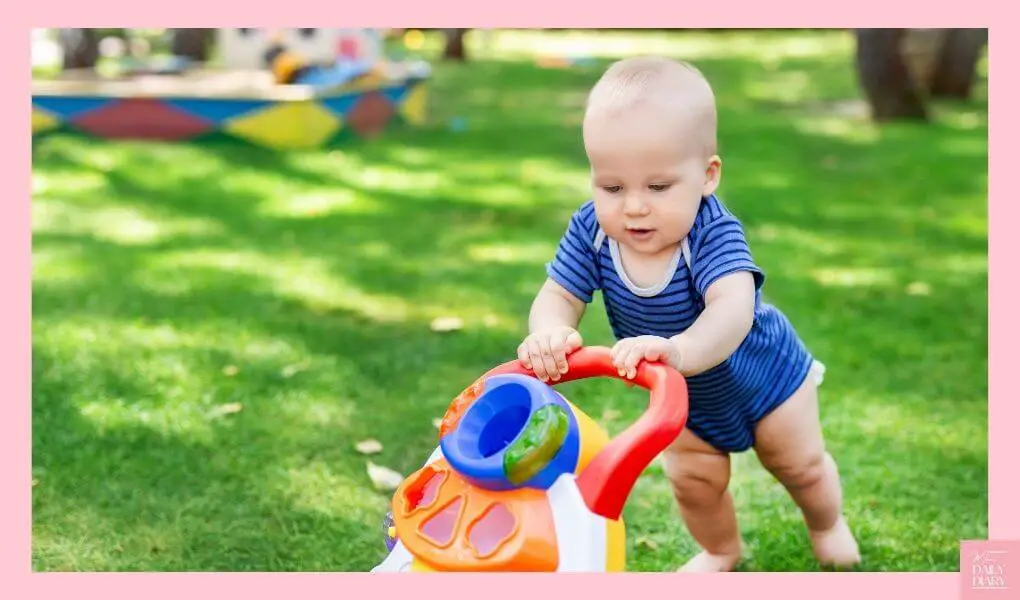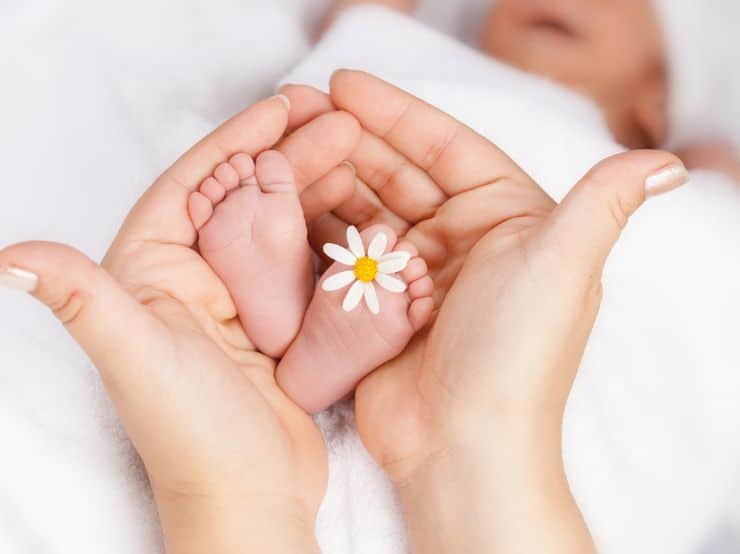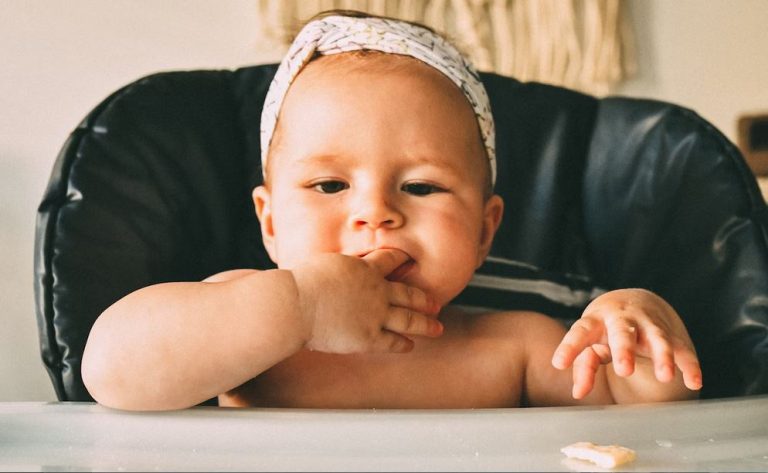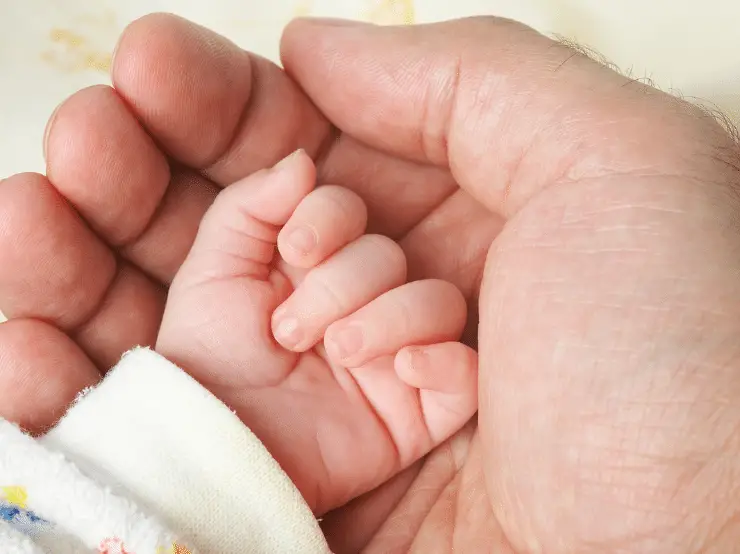9 Months Baby Development. What You Need To Know
10-month-old baby development →
Note: This post may contain affiliate links, which means if you buy from my link I might make a small commission. This does not affect the price you pay. See the full affiliate disclosure here.
Have you noticed that the end of the baby phase is just around the corner?
Your baby may already be pulling up and trying to do their first steps, showing preferences in different foods, and could even point at the objects they want.
Yes, your little one is slowly transitioning to a toddler! But let’s see what more is there about the 9 months baby development.
What to expect from your 9 months baby development

Physical growth
As your baby becomes more mobile, they will slowly start to lose their chubby looks and get leaner. Their weight gain will slow down significantly compared to the previous months, while their height may keep progressing.
Sleep
Most 9-month-olds still need two daily naps, one short in the morning, and one longer in the afternoon. And ideally, you should put them to bed around 7 p.m.
At this age, most babies are able to sleep through the night. Unfortunately, there are factors like teething, growth spurts, or overstimulation that may disrupt your baby’s sound sleep.
Having a routine is essential for the quality of your little one’s rest. If you feel like they are still restless at night or don’t get enough sleep you may consider amending your routine or turning to a sleep consultant.
If your baby is using a pacifier, now may be a good time to reduce its usage. Offering the pacifier at night or during naps will surely soothe your baby, however, you may want to avoid using it during their waking hours.
It may also be a good time to move your baby to their own full-sized crib and bedroom. While this transition may be frightening for many parents, for the babies it usually results in better and uninterrupted night sleep.
Feeding
Until their first birthday, your infant will need approximately 750-900 calories a day. And while half of those should still come from milk, whether breastmilk or formula, the other half needs to be solid food.
You can divide these into multiple meals and snacks:
- Wake up meal (milk only)
- Morning meal
- Late morning snack
- Afternoon meal
- Late afternoon snack
- Evening meal
- Bedtime meal (milk only)
Offering small but frequent feedings will keep them full without burdening their little tummies.
9 months is also a great time to introduce new foods like:
- Mild cheese
- Ham
- Bacon
- Pasta
- Flat ground seeds
You may also consider offering water after each solid meal. This will help your baby clean their mouth and stay well hydrated. Still, at this age, even a few sips of water from a sippy cup are considered enough.
Motor skills
Your 9 months baby development is heavily focused on their newfound mobility.
By now your baby is probably an expert at crawling around your home. Maybe even climbing a step or two up and down. They should be able to quickly change their position from crawling to sitting to lying on their tummy.
But the most exciting part is that they are eager to stand up and start walking. Well, it may take them a bit more before the actual walking (although my oldest made her first unsupported steps at 9 months). Still, they will be confident enough to hold on to the accessible furniture and start exploring your home from their new higher perspective.
These first steps may even tempt you into buying your baby’s first shoes. But unless you spend a lot of time outdoors and help your baby walk with support there, it may still be too early for shoes.
While indoors, it is best if you let your little one walk around bare-footed or with anti-slip socks only. This will help them develop their muscles further and learn to rely on the grip provided by their feet.
Personality development
While you may have noticed some traits of your baby’s personality a few months ago, by now they will really start showing. Are they going to be stubborn or rather calm and gentle? How to encourage their good behavior?
When I was a first-time mom, the trickiest part for me was to find the fine line between giving my daughter the freedom to explore on her own, and saying no. Eventually, however, it all fell into place.
The easiest way to encourage them to explore their personal traits is by providing them with a safe area in your home, where they can try out different toys and activities.
But it’s just as important to learn to say ‘no’.
Your baby is now old enough to understand from your tone and body language that this means that they need to stop what they are doing or going to do.
Still, don’t take it for granted that they will listen every time. You’ll need to keep an even closer eye on them which would make any side tasks difficult to complete. However, the foundation of discipline you can set at this young age will pay off big time in the long run.
9 Months baby activities

Fine motor development
Your baby is quickly learning to work with their hands. Therefore, any activities that help them practice their fine motor skills instead of just holding a toy, are highly recommended.
And while your baby may be too young to play with regular building blocks, the Press & Stay sensory blocks are perfect for their young age and unsteady hands.
Roll a ball
Yes, rolling a ball seems simple enough but it’s actually a great activity for your little one.
Not only do they get to exercise their motor skills by grabbing and rolling the ball. They also get to crawl around after it for quite a while.
And for some reason, it almost always makes them laugh.
Help them walk around
If your baby is pulling confidently to a standing position, now may be a great time to get them a walker.
Keep in mind, however, that many experts do not recommend the type of walker that the baby sits in because they are getting used to a false feeling of support that won’t be there later.
Instead, opt for one that your baby can hold on to and push around. And the great part is that many of these also have an integrated activity table that can keep them engaged for quite a while.
Read out loud
Yes, I know I’m repeating myself almost every month. But it’s for a good reason!
Reading to your little one helps them develop their language skills far more than simply talking, not to mention watching TV. And as a bonus, it’s also a great bonding time for mom and child.
And now that your baby is able to point at things they are interested in, don’t forget to tell them all about the things they notice in the books. Name the objects they are pointed at and describe them with simple words.
Ask them simple questions
Your baby may not be able to talk just yet but they understand a surprisingly high volume of simple words. Help them increase their vocabulary by asking them simple questions that they can answer by pointing, or just answer them yourself right after.
A few examples that are age-appropriate for your 9 months baby development include:
- “Where’s the cat/dog/cow?” after showing them a picture that includes the animal
- “Where is daddy?” when he enters the room
- “What does the cat say?” and responding with a “Meow!“
- “What is mommy doing now?“, responding with a simple explanation like “preparing lunch“, “changing your diaper“, or “kissing baby“
Teach them simple tricks
This is actually something I’ve really enjoyed with my oldest and looking forward to for my youngest.
9 months is a great time to teach your little one some simple tricks. All you need is a lot of patience and a good mood.
Here are a few examples:
- Wave “Bye bye”
- Give a thrown kiss
- Clapping
- Touch their index finger with yours
9 Months baby development milestones

Reaching new milestones is an exciting event for every parent. Still, you need to remember that all kids develop at a different rate. If you feel any concerns, don’t be quick to panic, and be sure to discuss your baby’s progress with their healthcare provider instead.
Social
- Goes to people they want to reach
- Waves ‘Goodbye’
- May experience separation anxiety
- Feels uneasy or cries around strangers
- Responds to their own name
Physical
- Crawls more confidently
- Sits without support
- Pulls to a standing position on their own
- “Walks” around by holding on to the furniture
- Stand up without support
- Attempts to make steps unsupported
- Walks a short distance
- Tries to feed themselves with finger food by using their thumb and index finger
Verbal
- Babbles actively
- Imitates simple words
- Tries to say words like “mamama”, “papapa”, “dadada”
- Understands “No!”
Cognitive
- Points to items they want with their finger
- Shows preferences in different foods
- Engages more with toys
- Likes to explore their surroundings
- Remembers where different items can be found
Sources:
